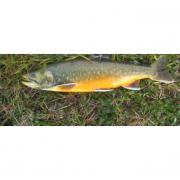Geneticists to investigate two important species of freshwater fish
Geneticists to investigate two important species of freshwater fish

The Arctic region, not least Greenland, is one of the places where climate change impacts are most apparent, resulting in changed living conditions for a number of organisms. Some species may move northwards, while others will benefit from the warmer climate and migrate towards areas where they have not formerly occurred, and some may perish. However, the possibility exists that the species may adapt genetically to the new climate conditions through evolution within a short-term time frame.
Funds for focused studies using DNA from freshwater fish
The Danish Research Council for Nature and Universe (FNU) has just awarded approx. DKK 6.5 million to a project investigating how two freshwater fish species in Greenland, Arctic charr and three-spined stickleback, may adapt to the ongoing climate changes. The project is managed by Professor Michael M. Hansen, Department of Bioscience, Aarhus University, and will be conducted in collaboration with the Arctic Research Centre, Aarhus University, the Greenland Institute of Natural Resources and researchers from Canada.
‘We will use new DNA techniques to investigate thousands of DNA markers (SNPs) distributed throughout the genomes of Arctic charr and three-spined stickleback. We will sample the fish within an approximate distance of 1,200 kilometers from south to north-west Greenland, and the DNA analyses will tell us which genes and which parts of the genome that are under selection as a result of the different temperature conditions,’ says Michael M. Hansen, professor of molecular ecology.
Genetic changes since the 1930s
For Arctic charr also old samples of scales and otoliths exist that were gathered during the 1930s to 1950s, allowing age determination of the fish. The researchers will analyse DNA from the samples and then compare the genetic variation in the same fish populations over a time range of 60-80 years. In this way, the project will provide unique insight into the genetic changes having occurred in recent decades.
‘Our analyses can reveal whether the two fish species adapt to changed temperature conditions over a short time scale, for instance through physiological adaptations or other genetic changes. In this way we hope to produce knowledge on fish, which are very important ecosystem components and which may at the same time serve as models showing which evolutionary adaptations to expect in other species as a result of the climate changes,’ Michael M. Hansen concludes.
Contact
Professor Michael M. Hansen, Department of Bioscience, Aarhus University, michael.m.hansen@biology.au.dk, tel. +45 40247191.





